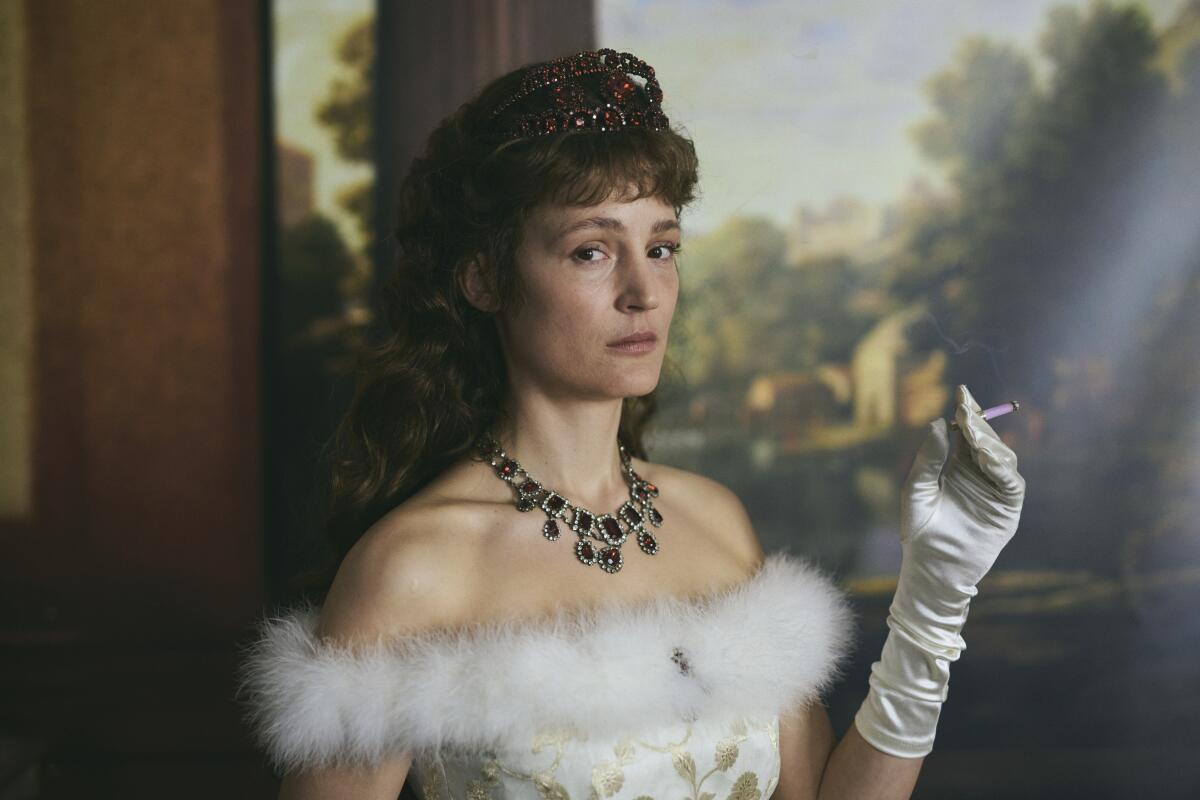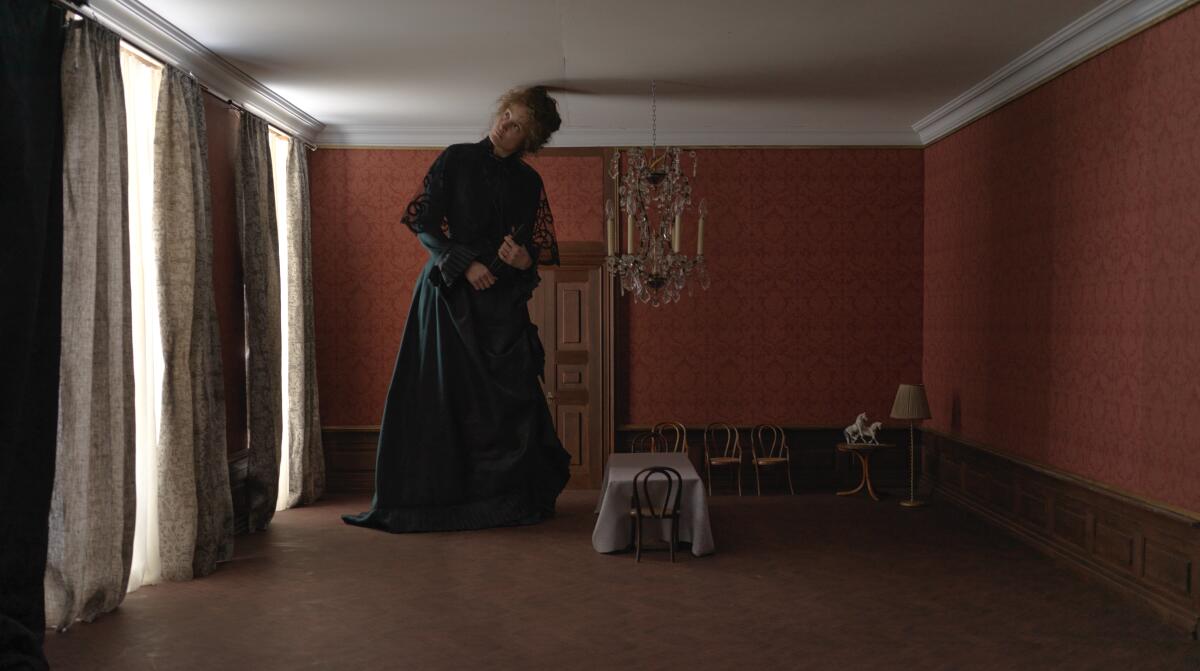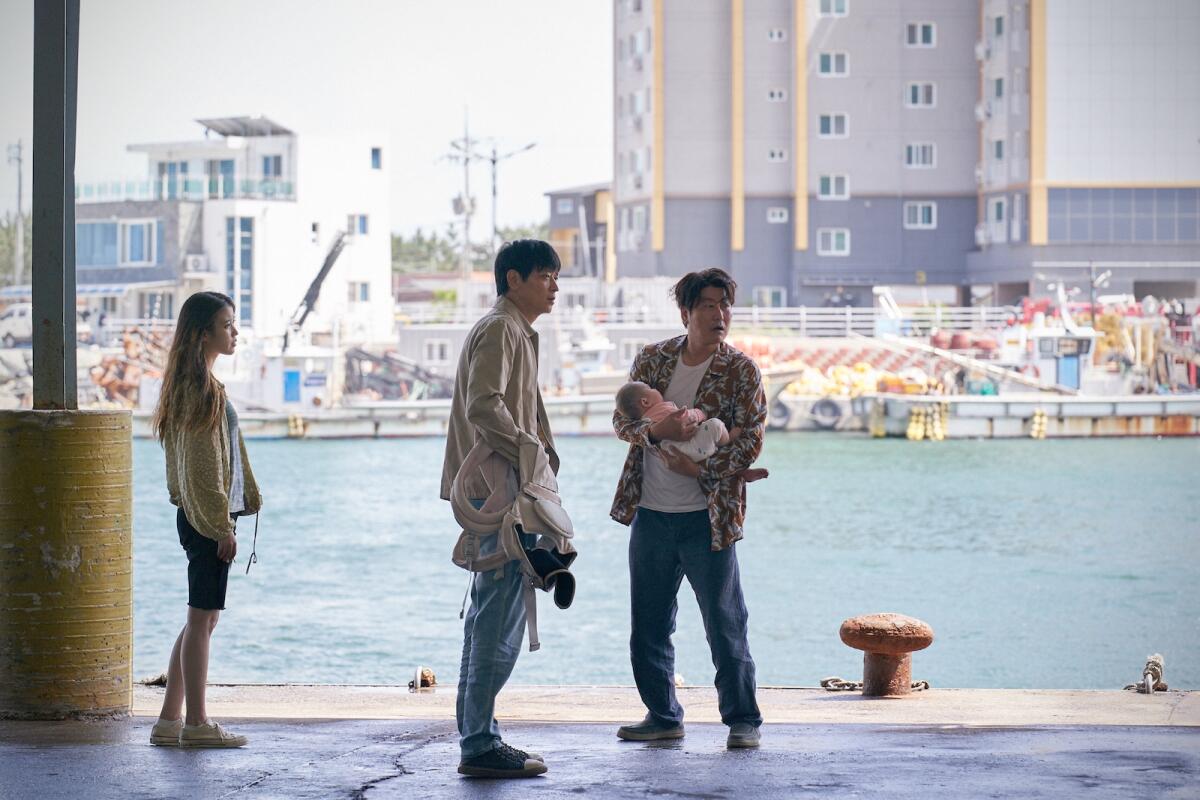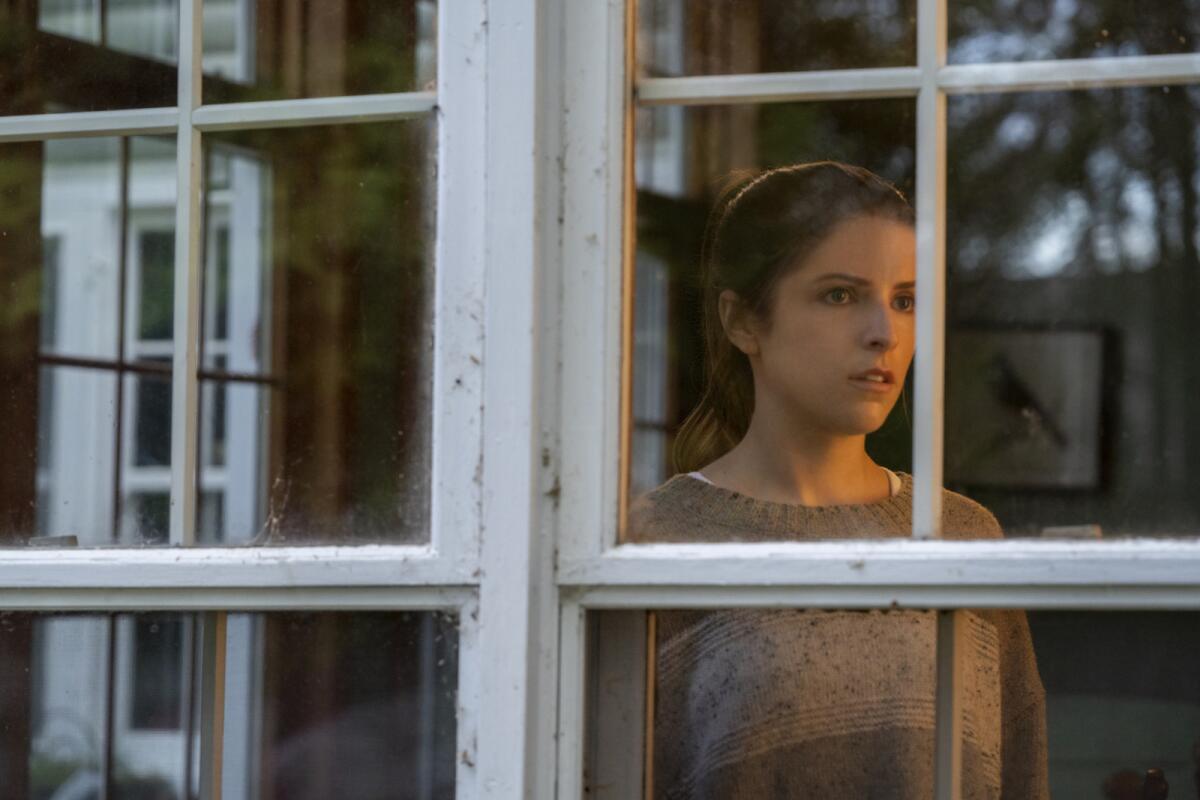How an empress rebels in ‘Corsage’

- Share via
Hello! I’m Mark Olsen. Welcome to another edition of your regular field guide to a world of Only Good Movies.
Thanks for joining us for one last newsletter of the year. We’ll be taking next week off.
Only good movies
Get the Indie Focus newsletter, Mark Olsen's weekly guide to the world of cinema.
You may occasionally receive promotional content from the Los Angeles Times.
Dance of anxiety in ‘White Noise.’ It’s no secret that Noah Baumbach is one of my favorite contemporary filmmakers, and his adaptation of Don DeLillo’s novel “White Noise” is both a departure and somehow totally in line with his previous work examinating family life and everyday anxieties in the face of extraordinary events. As Justin Chang put it in his review, “[Baumbach’s] affection for the novel produces its own warm, countervailing energy. Excessive reverence has killed many a well-meaning adaptation, but this “White Noise,” at once wildly mercurial and fastidiously controlled, somehow winds up triumphing over its own death. It’s too full of life — and also too funny, unruly, mischievous and disarmingly sweet — to really do otherwise.”
Josh Rottenberg spoke to Baumbach, choreographer David Neumann, production designer Jess Gonchor and cinematographer Lol Crawley about the film’s spectacular end-credits dance number, set to the new, Oscar-shortlisted LCD Soundsystem track “New Body Rhumba.”
As actor Don Cheadle put it, “With the dance itself, I don’t know that I ever fully understood what it was and why we were doing it. But when I saw the movie, I was like, ‘Oh, I guess this makes sense.’”
Angela Bassett tribute. The American Cinematheque will ring in the new year with a celebration of the career of Angela Bassett. The series opens Jan. 2 with Spike Lee’s “Malcolm X” in 70-millimeter — the film is truly breathtaking in this format — and also includes Bassett’s Oscar-nominated performance as Tina Turner in “What’s Love Got to Do With It,” as well as “Waiting to Exhale” and “How Stella Got Her Groove Back.” Bassett will be present for a Q&A after “Black Panther: Wakanda Forever.”
Enjoying this newsletter? Consider subscribing to the Los Angeles Times
Your support helps us deliver the news that matters most. Become a subscriber.
‘Corsage’
Written and directed by Marie Kreutzer, “Corsage” explores the life of Empress Elisabeth of Austria in 1877, the year of her 40th birthday. As portrayed by Vicky Krieps in a performance that has won numerous prizes, including at the recent European Film Awards, Elisabeth, nicknamed Sisi, is a woman pushing against the confines that society and royal protocols dictate for her. The movie is in theaters now.
For The Times, Robert Abele wrote, “A swanlike, silent-era-like presence with a vital allure, Krieps is fast proving to be a movie treasure (she was also great in this year’s French drama ‘Hold Me Tight’), and here the ‘Phantom Thread’ star plays Elisabeth as if preternaturally aware of the maw of history as it relates to male and female legacy, a modern woman trapped in a poisonous time-travel fantasy but refusing to give in without graceful defiance. … Overall, ‘Corsage’ shows a tantalizing way forward for the hopelessly staid biopic genre: honoring, provoking and upending with verve and humor as it liberates a complex woman from iconography’s deadening glamour.”
I spoke to Krieps about the project, which began with an idea she shared with Kreuzter. As Krieps put it, “I think a lot of it was intuition, but if I look at it now, I know what it was. I could feel in the story of this woman some sort of melancholia or depression or sadness coming from something we all have today a lot, which is alienation from yourself. ... Society taught me that I had to please, that I had to be pretty, that I had to be OK if someone grabs my ass, because that’s just what it is. And I never felt OK with any of it. And I think not feeling OK with it made me feel close to her in some sort of struggle that I didn’t understand at the time. But now I do.”
For the New York Times, Manohla Dargis wrote, “Elisabeth’s rebellion isn’t overt and obvious; it comes in stages, in small and large gestures, in furtive cigarettes, reckless flirtations and wild gallops across far-off fields. Krieps is wonderful to watch in motion, whether she’s in the saddle, crossing swords or just leaving a dinner. But she’s a virtuoso of stillness, and at times she brings to mind old Hollywood sphinxes like Garbo and Dietrich, whose inscrutable faces worked like wonderful screens on which you could project whatever fantasies you wanted. Yet Krieps is also a performer of the present moment, gesturally and otherwise, which is ideal for a character who’s caught between the old world and the new, and between the privileges that at once exalt and suffocate her.”
For Time, Stephanie Zacharek wrote, “Together, Kreutzer and Krieps explore the idea of female loneliness, a state that isn’t necessarily caused by men, but one that even so shuts them out of a woman’s world. Elisabeth is controlled by the strictures of her status and her time: the movie’s title refers not to a small bouquet of flowers, but to an older use of the word, describing a tightly laced bodice. Even if the metaphor is obvious, the movie is too well-rounded, and too pleasurable, to be reduced to easy symbolism. … And while Corsage doesn’t dramatize, or even mention, Sisi’s eventual assassination, it ends with an imagined leap of freedom, the happiest possible escape for an unhappy empress. Long may she live, beautiful may she remain! That’s the gift ‘Corsage’ gives to poor Sisi.”
For Rolling Stone, K. Austin Collins wrote, “This is a movie about the chokehold of a woman’s public persona, the mores and expectations that descend down on her from outside, a situation entirely divorced from her curiosities, feelings, interests. … Krieps carries the movie because we believe in her as a woman both of Elisabeth’s own time and place and simultaneously too modern — there’s a freedom behind her eyes that the movie rightly makes a meal of.”

Enjoying this newsletter? Consider subscribing to the Los Angeles Times
Your support helps us deliver the news that matters most. Become a subscriber.
‘Broker’
Written and directed by Japanese director Hirokazu Kore-eda, “Broker” is another of the filmmaker’s fable-like tales set on the margins of society, this time in South Korea. A ring of small-scale hustlers and outcasts involved in human trafficking swipe babies from a charity’s “baby box” for abandoned newborns and sell them via a black-market adoption ring. Song Kang-ho became the first Korean actor to win the best actor prize at the Cannes Film Festival for his performance as Sang-hyeon in the movie, which is in theaters now.
For The Times, Gary Goldstein wrote, “There’s certainly enough potential mayhem, desperation and danger here (including the gangsters on Sang-hyeon’s tail) for ‘Broker’ to have become a dark, propulsive action-drama, in another filmmaker’s hands. But Kore-eda focuses on — and mines — the grace notes, better angels and soulfulness of his characters in such lovely and relatable ways that we’re grateful for his humanistic, more empathetic priorities. To his extra credit, he manages it all without things turning overly sentimental.”
For the New York Times, A.O. Scott wrote, “Somehow, ‘Broker’ doesn’t feel overplotted, overly cute or excessively melodramatic. Kore-Eda has an emotionally direct style, a way of fusing naturalism and fable that recalls the neorealist magic of Vittorio De Sica. His characters are silly, suffering, dignified creatures, on whom the audience’s sympathy descends like grace. … Kore-Eda, remarkably, doesn’t counterfeit a happy ending, but he also refuses despair. He’s an honest broker of heartbreak.”
For the AP, Lindsey Bahr wrote, “‘Broker’ is not an edge-of-your-seat crime thriller or maudlin drama. Yes, there are two cops on the tail of several men who have a shadowy business selling orphaned and deserted kids to wealthy owners. Yes, there are shades of a large, powerful crime syndicate looming. And yes, there are abandonment issues aplenty. … But “Broker” isn’t interested in definitive answers or moralizing, but instead empathy for both the mothers in impossible situations and the children haunted by their abandonment.”

‘Alice, Darling’
Directed by Mary Nighy from a screenplay by Alanna Francis, “Alice, Darling” manages to be both subtly delicate and extremely powerful as it tells a story of emotional abuse, as Alice (Anna Kendrick) struggles to break free of her emotionally abusive boyfriend through the help of two close friends (Wunmi Mosaku and Kaniehtiio Horn). The film is in theaters now.
For The Times, Michael Ordoña wrote, “‘Alice, Darling’ is a slow-developing drama about a woman traumatized by an abusive, codependent relationship. Ultimately, it’s about the bonds of sisterhood and how those who know you best and love you most can help you heal, or at least start you on that path. Its vagueness serves almost as a Rorschach test. How effective it is as a drama may depend on your perspective.”
Lorena O’Neil spoke to Kendrick about the film. In promoting the movie, Kendrick has been extremely open and vulnerable about having recently left an emotionally abusive relationship herself before making the film, and how the movie has become part of her recovery. The film does not show physical abuse, she points out, so signs of the character‘s trauma must exist within her. “I was begging Mary, ‘Can Alice be the evidence?’” Kendrick said. “Because not only do I want us to not make a movie that’s already been made, but personally, I need to trust that I’m the evidence. Part of it was like, if you can’t trust Alice, then I can’t trust myself. So it was really, really important that the movie relied so heavily on just staying with Alice.”
For the Playlist, Marya E. Gates wrote, “Anchored by Kendrick’s best performance in years and Francis’ incisive script, ‘Alice, Darling’ is a visceral, deeply felt clarion call, not just for more awareness of the signs of emotional, intimate partner violence but also as a reminder to those who have experienced this abuse to allow themselves some grace.”
For the Hollywood Reporter, Lovia Gyarkye wrote, “In Mary Nighy’s emotionally disquieting debut ‘Alice, Darling,’ Kendrick transfixes, affirming that she has always had depth and range. … It’s through Alice’s compulsions — pulling strands of hair, winding them tightly around her index finger, obsessively counting calories — that we see the cruelty of her relationship. Nighy prefers suggestion to explanation.”

Only good movies
Get the Indie Focus newsletter, Mark Olsen's weekly guide to the world of cinema.
You may occasionally receive promotional content from the Los Angeles Times.




